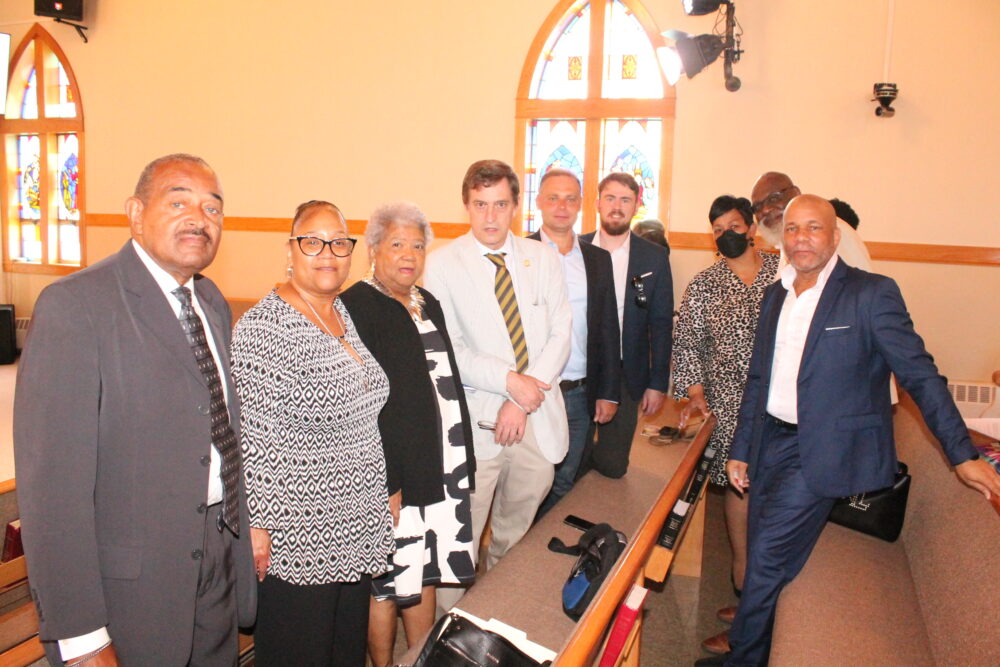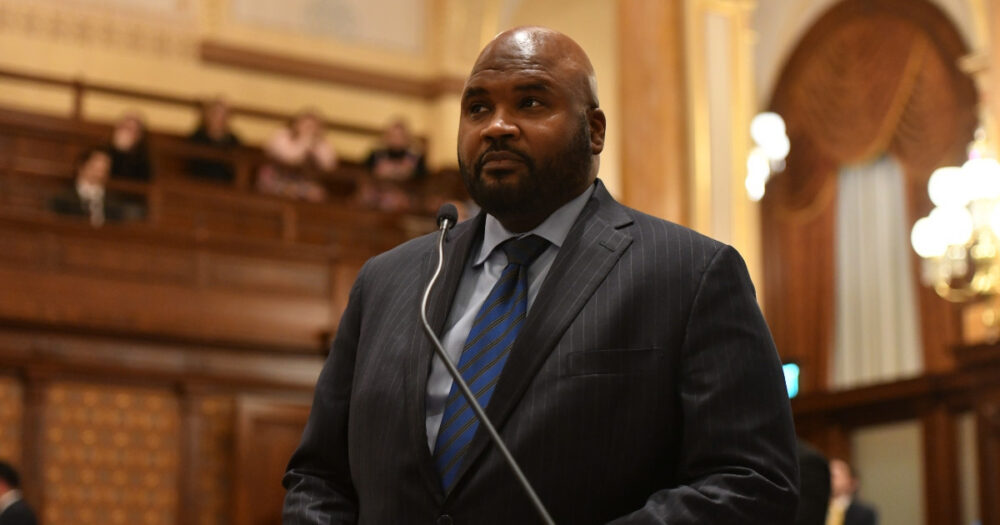When medical marijuana sales began in Illinois in 2014, cannabis firms typically chose unobtrusive buildings, sometimes hidden away in industrial parks, to sell the controversial product.
Almost 10 years later and with recreation weed now legal in the state, cannabis has become big business. Dispensaries are moving from the out-of-the-way buildings where they started into some of the hottest retail corners in both city and suburbs. National companies have swept in to buy local dispensaries, fueling further expansion and helping create multistate operators worth billions.
Advertisement
But amid all the moneymaking, one group is being shut out.
The state held lotteries last summer to award marijuana retail store licenses to “social equity applicants,” business owners from communities or families hurt by the war on drugs. But a judge froze the program after several losing applicants sued, leaving winning applicants in limbo as the rest of the marijuana industry took off. A judge recently authorized the state to hold a corrective lottery for the applicants that filed lawsuits.
Advertisement
“It’s just been disappointing to sit on the sidelines and watch the current operators make hundreds of millions of dollars,” said Ambrose Jackson, a former hospital administrator who won one of the social equity licenses before the program was frozen.
Social equity hopefuls keep pushing forward, sometimes leasing or purchasing properties and completing store designs, all without being able to operate and bring in revenue. But the expense of securing real estate for a cannabis-focused business, combined with the industry push toward fancier, pricier spaces, threatens to leave social equity applicants behind.
“All the social equity applicants are bleeding dollars, and every single month that goes by, people like me, those that the program is supposed to help, are getting hurt,” Jackson said.
Securing a site for a cannabis store has never been easy. Many landlords are reluctant to host cannabis retailers, limiting available spaces. And with banks still leery of cannabis, traditional loans are not an option. It adds up to high costs for anyone jumping into cannabis, especially startups without financial connections.
But large, multistate dispensary operators like Cresco Labs are planting flags along top retail corridors like East Golf Road in Schaumburg, or at the intersection of Skokie Boulevard and Old Orchard Road in Skokie, where Curaleaf has a 15,000-square-foot flagship dispensary.
“If you go into a dark alley, you feel as if you’re doing something shady, so we want to be next to a Whole Foods,” said Cresco Labs Executive Vice President Chima Enyia.
Progressive Treatment Solutions, which operates 11 dispensaries nationwide, including several in Illinois, just became the latest cannabis bigwig to plan an expansion into a top retail corridor. The company started off in Chicago selling medical marijuana from 6428 N. Milwaukee Ave., a small building in Norwood Park on the Northwest Side, but now wants to sell its Consume brand recreational cannabis at the former Rainforest Cafe at Clark and Ohio streets in River North, across the street from McDonald’s flagship restaurant in Chicago.

“It’s a vibrant community, and I think everyone agrees if you want to have a thriving business, you need to be in a vibrant community,” PTS CEO Terry Peterson said at a contentious community meeting on May 10 in River North.
Advertisement
If regulators approve, the firm plans to spend between $7 million and $10 million upgrading the vacant building into an ultramodern retail space, according to Peterson, a former 17th Ward alderman and head of the Chicago Housing Authority.
Paying for the expansion likely won’t be a problem for PTS. Even though banks stay clear of it, cannabis is such a lucrative product that multistate operators can still raise funds from more adventurous lenders and investors, and PTS is no exception. County records show PTS was one of the borrowers on a $56 million mortgage loan, secured by the Norwood Park property, from a New York-based lender. The same loan was revised in March, growing to $106 million, an astonishing amount considering the one-story structure was bought for $750,000 in 2016.
A spokesperson for PTS said the company can’t divulge financial details about the firm or its properties.
Other cannabis titans are looking to upgrade their spaces. New York-based Verano Holdings, one of the nation’s largest cannabis providers, last year purchased GreenGate Chicago, an independent dispensary in Rogers Park. Verano officials told a North Side community meeting in March that they wanted to move GreenGate, now tucked away on a side street, to a former Leona’s restaurant on Sheridan Road, a top Rogers Park thoroughfare.
Jackson just wants to get started. In addition to the license his firm, 1937 Group, won to start a downstate dispensary, he was also awarded licenses to establish a craft growing operation, as well as the right to transport cannabis products. His team spent several years scouting locations, working on designs, floor plans and meeting government demands for airtight security.
Doing that without steady cash flow isn’t easy, Jackson said. Getting a full-scale operation up and running costs millions, so there are always bills to pay. The company pays rent on a 50,000-square-foot industrial property in suburban Broadview where Jackson plans to grow and package cannabis and process oil from the plants, among other activities.
Advertisement
“We’ve been paying $26,000 a month for a couple of years now in rent since we didn’t have enough money to buy the building outright,” said Jackson.
Big cannabis providers are sensitive to the charge that legalization has mostly benefited large, white-owned firms, and in some cases they are lending a hand. Companies such as Cresco and Chicago-based Green Thumb Industries helped several social equity groups get through the initial qualifying process or extended zero-interest loans and other investments.
“This is about creating multigenerational wealth in Black and brown communities,” said Wendy Berger, a board member of GTI and head of investment and development firm WBS Equities. “When vetting the social equity applicants, we wanted to make sure they could run a successful business and that their values aligned with that goal.”
Cory Croft, a social equity applicant who completed GTI’s cannabis training program, said legalization can still prove beneficial to disadvantaged communities. His firm InLabs 1 won the right to open a dispensary in the Chicago metro area and Croft, also the general manager of Sonder, Inc., a hospitality design firm, wants to open shop on Chicago’s West Side in the Illinois Medical District.
“First and foremost, I believe in the medical benefits of cannabis, even though we have a recreational license, but second, the (Illinois Medical District) is close to North Lawndale and other neighborhoods on the West Side where investment is low, so we see this as a way to create jobs and give people a chance to work.”
Still, the delay means he’s spent about $200,000 on the effort, with no result. And he’s not sure the Illinois Medical District locations he’s scouted will still be available when the social equity program officially kicks off.
Advertisement
In addition to providing some equity and zero-interest loans to social equity applicants, Cresco, which runs 10 Illinois dispensaries, also began hosting training workshops at its former dispensary in the Lakeview neighborhood after it relocated to a new and larger store a few blocks away, according to spokesperson Jason Erkes.
“But this can’t go on forever, and we can only do so much,” Erkes said. “We can only hope the licenses are released soon.”
If the licenses are released, Josh Joseph said real estate investors could also lend a hand. He founded Chicago-based Grassroots Cannabis, which Curaleaf purchased in a 2020 deal for more than $800 million. He then cofounded Nashville-based cannabis company BPH Legacy Partners, along with former NFL players Jordan Reed and Dominique Easley, and plans to buy up properties in several states, lease them back to social equity operators, helping them avoid the expense of securing real estate. Joseph’s firm has about 12 such properties under contract across Illinois and is ready to pull the trigger once the court releases the licenses.
“We have five locations in Chicago that are locked and loaded at this point,” he said.







